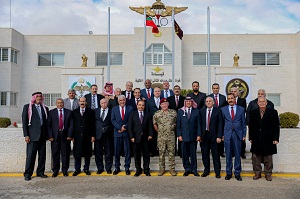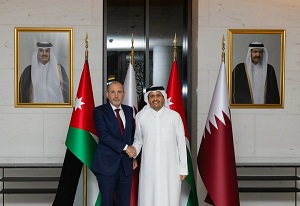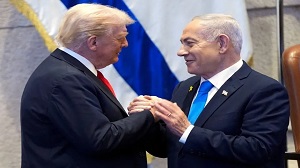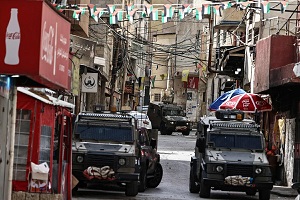
Taylor Luck, The Jordan Times
AMMAN — Islamists across the political and religious spectrum in Jordan have been deeply divided by the country’s participation in US-led air strikes against the Islamic State (IS) in neighbouring Iraq and Syria, balancing concerns for the country’s security against what some perceive as a wider war against Islam, or civilian deaths.
The Muslim Brotherhood became the first movement to come out in opposition to Jordan’s participation in the US-Arab coalition-led air strikes against IS, issuing a statement dismissing the campaign as “not Jordan’s war”.
The Brotherhood’s deputy leader Zaki Bani Rsheid called on supporters to pressure the government to withdraw from the coalition on the grounds that the air strikes serve as a boost to Syrian President Bashar Assad, whose regime has historically stood as an arch foe of the Brotherhood.
Yet far from politics and in the realm of religion, Islamists are more deeply divided, as various schools of Islamic thought and clerics grapple with opposing views over the religious legitimacy and moral consequences of the air strikes.
Jordan’s hard-line Jihadi Salafist movement, the 6,000-8,000 strong group of ultra-radical clerics and supporters with allegiances to both Al Qaeda and the IS, have been quick in denouncing US-led strikes against the jihadist group, claiming that the campaign is tantamount to a “war against Islam”.
“The Islamic State is still an Islamic movement and part of the Muslim Ummah, even if it committed mistakes and abuses against fellow Muslims and secularists,” Abu Sayyaf, a leader within the Jihadi Salafist movement, said.
“From an Islamic standpoint, the killing of innocent women, children and civilians is wrong and forbidden, and the killing of mujahadeen defending Muslims against massacres is forbidden — and that is precisely is what is occurring in Syria.”
The targeting by US and its Arab allies of Islamist militias in Syria has even served to unite Jordan’s Jihadi Salafist movement, which had previously been deeply divided by the growing rivalry between Al Qaeda and its former offshoot, IS.
Abu Mohammad Al Maqdissi, or Essam Barqawi, Al Qaeda spiritual leader in Jordan and Salafist “theoriser”, called on supporters of the rival jihadist groups to unite to face what he termed “a crusader campaign” against Islamist militias, claiming that the air strikes have indiscriminately targeted Muslims and come as part of a wider offensive by “unjust powers” against Islam.
Despite the protests by hard-line movements, the bulk of the Islamic religious establishment in Jordan has come forward with cautious support for the attacks.
Traditional Salafists, the more mainstream conservative school of thought which dominates the country’s mosques and steers clear of the political realm, have given their conditional approval of efforts to “secure Jordan’s security and stability”, which is “a religious duty”.
Traditional Salafists say they base their religious backing of the air strikes on the belief that IS supporters and fighters have “deviated from Islam” and have violated the Koran, Prophet Mohammad’s teachings and scholars of the Islamic nation” with their violence against non-Muslims and Muslims alike.
“Our country has the longest borders with Iraq and Syria, and there is no doubt that the Islamic State is expanding and threatening Jordan itself,” Ali Al Halabi, leading Salafist cleric and theologian, told The Jordan Times.
“Jordan is taking part in this coalition in order to ensure the country’s security and stability and to protect its citizens, which is the government’s civil and Islamic duty.”
So-called reformist Salafists — progressive and moderate Salafists who believe in social activism as a means to promote their religious message — have too come out in support of the offensive against IS.
They base their approval of the bombings on the basis that IS poses a threat from within Jordan’s boundaries, claiming that the movement preys on the underprivileged and diverts citizens from the true meaning and message of Islam.
“While there is no question that the state’s military and security services are strong and can protect the country’s borders, more needs to be done to protect young men and women from falling prey to the Islamic State’s poisonous ideology,” said Zeid Hammad, reformist Salafist activist and head of Al Kitab and Sunna charitable society.
“The Islamic State is not just a security threat, but a social ill that we need to stop from arriving and spreading in Jordan.”
However, even those backing Jordan’s growing role in the US-led war against IS have expressed reservations as the offensive stretches on.
Islamists and Salafists from across the board have expressed concern at the unintentional killing of civilians.
“It is forbidden to kill civilians in any war — Muslims or non-Muslims. Once this occurs, the war loses its legitimacy,” Halabi warned.
Salafist and Islamist leaders also express concern over attempts to portray the bombings as a wider “war against Islam”.
Clerics point to the West’s coverage of the war against IS and the use of various news outlets of the term “Sunni militants” to describe IS as what they see as a dangerous attempt to associate the belligerent group to the Sunni Muslim community.
“If we begin to link the Islamic State group with Islam, no military offensive, no matter how large the coalition, will ever succeed,” Halabi said.
Latest News
-
 King meets with retired brothers-in-arms from Special Forces
King meets with retired brothers-in-arms from Special Forces
-
 Foreign Minister, Qatari prime minister discuss bilateral ties, Gaza developments
Foreign Minister, Qatari prime minister discuss bilateral ties, Gaza developments
-
 Jordan beats Egypt to reach 9 points at top of group C in Arab Cup
Jordan beats Egypt to reach 9 points at top of group C in Arab Cup
-
 Netanyahu to Meet Trump on December 29
Netanyahu to Meet Trump on December 29
-
 Hamas says no Gaza truce second phase while Israel 'continues violations'
Hamas says no Gaza truce second phase while Israel 'continues violations'